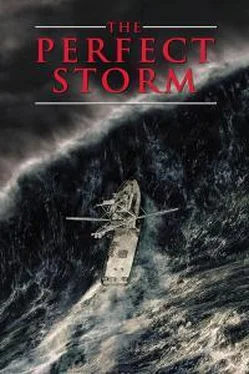Sebastian Junger - The Perfect Storm
Здесь есть возможность читать онлайн «Sebastian Junger - The Perfect Storm» — ознакомительный отрывок электронной книги совершенно бесплатно, а после прочтения отрывка купить полную версию. В некоторых случаях можно слушать аудио, скачать через торрент в формате fb2 и присутствует краткое содержание. Жанр: Триллер, Проза. Описание произведения, (предисловие) а так же отзывы посетителей доступны на портале библиотеки ЛибКат.
- Название:The Perfect Storm
- Автор:
- Жанр:
- Год:неизвестен
- ISBN:нет данных
- Рейтинг книги:3 / 5. Голосов: 1
-
Избранное:Добавить в избранное
- Отзывы:
-
Ваша оценка:
- 60
- 1
- 2
- 3
- 4
- 5
The Perfect Storm: краткое содержание, описание и аннотация
Предлагаем к чтению аннотацию, описание, краткое содержание или предисловие (зависит от того, что написал сам автор книги «The Perfect Storm»). Если вы не нашли необходимую информацию о книге — напишите в комментариях, мы постараемся отыскать её.
The Perfect Storm — читать онлайн ознакомительный отрывок
Ниже представлен текст книги, разбитый по страницам. Система сохранения места последней прочитанной страницы, позволяет с удобством читать онлайн бесплатно книгу «The Perfect Storm», без необходимости каждый раз заново искать на чём Вы остановились. Поставьте закладку, и сможете в любой момент перейти на страницу, на которой закончили чтение.
Интервал:
Закладка:
And then there are the nearly-dead. Kosco, Hazard, Reeves—these people are leading lives that, but for the merest of circumstances, should have already ended. Anyone who has been through a severe storm at sea has, to one degree or another, almost died, and that fact will continue to alter them long after the winds have stopped blowing and the waves have died down. Like a war or a great fire, the effects of a storm go rippling outward through webs of people for years, even generations. It breaches lives like coastlines and nothing is ever again the same.
"My boss took me to a hotel and the first thing I did was have three shots of vodka straight up," says Judith Reeves, after she got off the Eishin Maru #78 in Halifax on October 31st. (The engineer had rigged up some cables in the hold that, manually, turned the rudder. The captain shouted commands down to him from the bridge, he pulled the cables, and that was how they weathered the storm.) "I called my mom and then my roommate and I didn't sleep that whole first night because the hotel room wasn't rocking. Next morning I did 'Midday,' the CBS news show here, and then I went to the CBC studios for another interview, and that was the first time that I got scared. I started smoking and drinking and by the time I went to the third interview I was quite hammered. They wanted to do it live and I said, 'Are you sure about that?' I was in such demand by the media for two or three weeks, I mean the whole country was praying for me, it was kind of a high. But then I went home in December to see my mom and dad and as soon as I got back here I fell into a depression. I lost a lot of weight and started going on these long crying jags. You can only sustain that high level for so long before you break down; you finally become an ordinary person again."
Reeves keeps working as a fisheries observer and eventually meets, and marries, a Russian fisherman from one of her boats. Karen Stimpson, who also spent several days at sea thinking she was going to die, breaks down more quickly than Reeves but not as badly. After the rescue she stays at a friend's apartment in Boston, avoiding reporters, and the next day she decides to go out and get a cappuccino. She walks into a cafe around the corner, orders, and then pulls a roll of bills out of her pocket to pay. The bills are wet with seawater. The man at the cash register looks from her face to the wet bills to her face again and says, I know you! You're the woman they saved off that boat!
Stimpson is horrified; she pushes the money at him, but he just waves her away. No, no, it's on us. Just thank God you're alive.
Thank God you're alive . . . She hadn't thought about it like that but, yes, she could well be swirling around in the freezing black depths off Georges right now. She grabs her coffee and runs out the door, sobbing.
TWO weeks after the search for Rick Smith has been called off, Marianne gets a telephone call from a man named John Monte of Westhampton Beach, Long Island, who says that he's a psychic and that Rick Smith is still alive. He tells her that he talked to Suffolk Airbase and that they want to resume searching for him.
Marianne's heart sinks. It's taken her two weeks to accept the fact that her husband is dead, and now she's supposed to start hoping all over again. There's no way Rick could still be alive, but she's afraid of what people might think if she discourages a search, so she gives her okay. The PJs at the base are worried about the same thing—what Marianne will think—so they give their okay as well. Monte gets a local lawyer named John Jiras interested in the case, and Jiras drafts a letter to New York State Representative George Hochbrueckner demanding that the search be resumed. Hochbrueckner passes the letter along to Admiral Bill Kime, Commandant of the U.S. Coast Guard, and the case filters through the command structure back to Di Comcen in Boston. A response is drawn up explaining how thorough the search was and how unlikely it would be that a man could survive twenty-six days at sea, and that is sent back up the ladder to Kime. Meanwhile, Monte gives Marianne a list of press contacts to call to publicize the case—and himself. "It's the only time in my life I thought I was going crazy,"
she says. "I finally told him to get lost. I couldn't take it anymore."
After almost a month, Marianne Smith is able to start absorbing the loss of her husband. As long as the planes are going out she holds on to some shred of hope, and that keeps her in a ghastly kind of limbo. Several weeks after Rick's death, she dreams that he comes up to her with a sad look on his face and says, I'm sorry, and then gives her a hug. It's the only dream she ever has of him, and it constitutes a goodbye of sorts. Marianne takes her children to a memorial service in Rick's hometown in Pennsylvania, but not to the one on Long Island, because she knows there are going to be a lot of television cameras there. ("Children don't grieve in front of crowds—they grieve in bed saying, 'I want Daddy to read me a book,'" she says.) George Bush sends her a letter of sympathy, as does Governor Mario Cuomo. Marianne discovers that, as a widow, she makes people extremely uncomfortable; either they avoid her or treat her like a cripple. Marianne Smith, who started out as an avionics technician for an F-16 squadron, decides to face her widowhood by going to law school and becoming a lawyer.
John Spillane gets a job as a New York City fireman, in addition to his PJ status. One night he's half awakened by the station alarm, and for some reason the room lights don't go on. He's terrified. He finds himself by the exit pole thinking, "It's okay, you've been through this before, just keep your head." All he knows is that it's dark, there's not much time, and he's got to go downward—exactly the same situation as in the helicopter. By the time he finally understands where he is, he's put on all his fire-fighting clothes. He's fully cocked and ready to go.
The storm hasn't yet finished with people, though; hasn't stopped reverberating through people's lives. Eighteen months after the ditchings, a nor'easter roars up the coast that, even before it's fully formed, meteorologists are referring to as the "Mother of All Storms." It has a distinct eye, just like a hurricane, and a desperately low central barometric pressure. One ship in its path watches wave heights jump from three feet to twenty feet in less than two hours. The storm drops fifty inches of snow on the mountains of North Carolina and sets all-time barometric records from Delaware to Boston. Winds hit no miles an hour in the Gulf of Mexico, and the Coast Guard rescues 235 people off boats during the first two days alone. Wave heights surpass sixty feet off much of the East Coast and creep up toward one hundred feet off Nova Scotia. Data buoys record significant wave heights—the average of the top third—only a few feet lower than in the storm that sank the Andrea Gail. By the narrowest of margins the "Halloween Gale," as that storm has come to be known, retains the record for most powerful nor'easter of the century.
Caught in the worst of this is the 584-foot Gold Bond Conveyor, the freighter that, two years earlier, had relayed the Satori's mayday to Boston. The Gold Bond Conveyor has a regular run between Halifax and Tampa carrying gypsum ore, and on March 14th, about a hundred miles southeast of where Billy Tyne went down, she runs into the Mother of All Storms. She's the only vessel of any kind to encounter both storms at their height, and they happen to be two of the most powerful nor'easters of the century. One could say the vessel was marked. That evening the captain radios Halifax that waves are breaking over their upper decks, and shortly after midnight he calls again to say that they're abandoning ship. The seas are a hundred feet and the snow is driving down sideways in the dark. Thirty-three men go over the side and are never seen again.
Читать дальшеИнтервал:
Закладка:
Похожие книги на «The Perfect Storm»
Представляем Вашему вниманию похожие книги на «The Perfect Storm» списком для выбора. Мы отобрали схожую по названию и смыслу литературу в надежде предоставить читателям больше вариантов отыскать новые, интересные, ещё непрочитанные произведения.
Обсуждение, отзывы о книге «The Perfect Storm» и просто собственные мнения читателей. Оставьте ваши комментарии, напишите, что Вы думаете о произведении, его смысле или главных героях. Укажите что конкретно понравилось, а что нет, и почему Вы так считаете.












